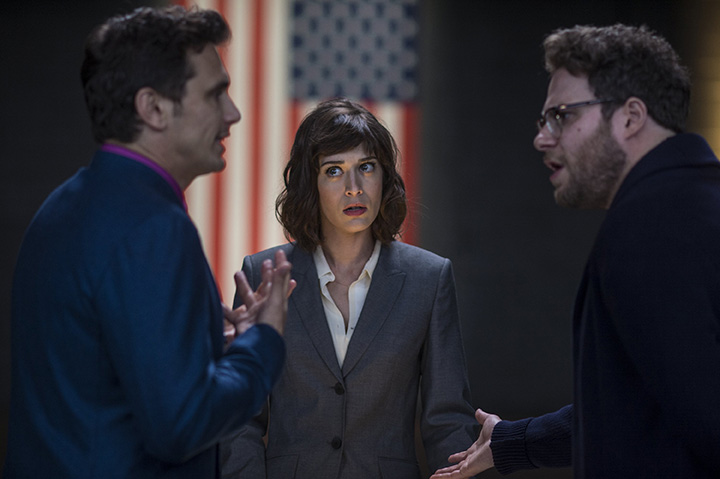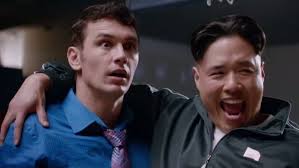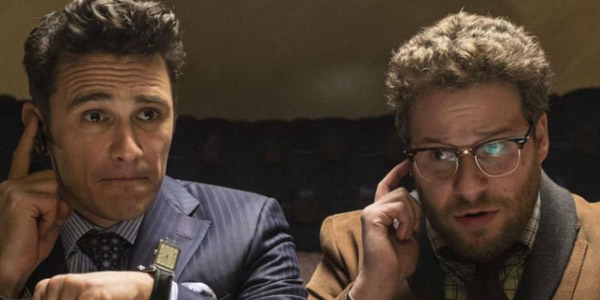|
|||||||||||||||||
November 2009 Web Edition Issue #3 |
|||||||||||||||||
| Mondo Cult Forum Blog News Mondo Girl Letters Photo Galleries Archives Back Issues Books Contact Us Features Film Index Interviews Legal Links Music Staff |

Columbia Pictures
reviewed by Jerry JewettWriter Dan Sterling has written abundant material for television, giving him the insider’s knowledge needed to script a movie about a duo of ratings-mad documentary/exposé and talk-show TV personalities, fellows who seek both enhanced professional respect and a major ratings coup. Host and Interviewer Dave Skylark, played by James Franco, discovers to his great surprise that North Korea’s dictator Kim Il Jung (Randall Park) greatly enjoys The Dave Skylark Show as a fan. Meanwhile, Dave’s producer Aaron Rapoport (Seth Rogen) finds himself publicly humiliated by a fellow journalism alum who has a position with a large network doing “respectable” work, but disdains Rapoport’s lower-budget interviewees and sensational stories. The approval- craving egos of these two cohorts fire them to pursue a wacky plan of meeting The Great Dictator for an exclusive live world interview, which would bolster the reputations of both of them.
Some of the arcs require a leap of faith, such as the foot trip by Rapoport, alone and unsupported, into the mountain wilderness of the Korean peninsula, where a huge helicopter lands and he meets Sook, the Chief Information Officer of The Great Dictator, played to perfection by Diana Bang. But far more improbable leaps have been required in other movies. Those not previously inclined to dismiss the movie on doctrinaire grounds should have little trouble following the lines and curves in this production. As a disclaimer, I see entertainment through the lens of anarcho-libertarianism, with a whole-hearted loathing for American imperialism as dictated by the Council of Foreign Relations (and similar open and notorious members of the Permanent Regime, as the gentleman at Dispatches from the Last Ditch so appropriately name them). Even so, I also acknowledge that we live in a Statist world where the evil some States do is the thing for which they are best known. I am also a Midwestern WASP who typically does not find scatological humor, gutter language, or vainglorious male sexual aggression funny. That, and I had a predisposition to see James Franco in the worst possible light, just as a personal prejudice.  Had this movie opened as originally planned, I might have given it a miss. However, this flick went from a national release pseudo-blockbuster, to banned (self-censored by corporate prudence, under the Protocols of the International Accord Not to Inflame Madmen Dictators with Nuclear Weapons at Hand), to underground movie status, in less than a week, in a circus of media madness, political saber-rattling, and diplomatic oddity. One of the leaders of the Cinefamily consortium addressed the crowd before the Christmas Day showing I attended at 611 N. Fairfax in Los Angeles. I emerged late from the restroom and so did not catch his name or all of his comments, but I do recall he said, “When they said, ‘Nobody will run this,’ I thought to myself, ‘We’re small, but we’re not Nobody.’” Bless his heart and that of his Board of Directors, they ran the movie, in their art-house venue. The old Silent Movie Theater , located on Fairfax between Melrose and Beverly, dates back to the days before “talking movies.” All manner of cinema, and other entertainments, take place here, in an environment of total support for the arts, arts of the nature which do not fill mall theaters. Though one may hope that the risk-takers who created this movie will at least recoup their costs via Blue-Ray and regular DVD sales, plus whatever Internet sales provide them, there is no substitute for seeing a movie like this on a true cinema screen. The Silent Movie Theater lacks “stadium seating,” the floor is pretty flat, and the screen is modest in contrast to modern mall theaters. The lights and sound work as they should, though, and the seating is comfortable. No one watching at home will recall the savor added by the NBC News live broadcast truck and crew out front, nor the uniformed LAPD keeping watch on the proceedings, not the sense of camaraderie found in that theater. Some form of cult movie status may yet attach to this production. Some of the humor is diabolically funny. There is satire here which not only skewers the totalitarian dictator, but also sinks some barbs into Hollywood in particular and the mass media entertainment industry in general. Though billed as an action comedy, strong elements of drama and satire fill out the dimensionality of this movie, making it anything but a flat experience. The pop psychology employed is the pop psychology that the people know and love. The references to prior and similar works are apt and catchy. Nothing has been spared to give visual effects their just due. All too often, for example, in a movie, when someone is shot in the head (and assuming the weapon is more powerful than .22 caliber), the slug just seems to remain in the victim’s skull: instant death, no mess. Not so here! And you like maiming? Early references to Bilbo and Gandalf have gory echoes later. The gore fits the action and does not seem superposed just for the sake of sensationalism. Though certain formulae are observed (a story without a beginning, middle and end would make a pretty sorry excuse for a story), originality abounds here as well. Anytime you have a movie about TV, one can pretty well expect some self-congratulatory excesses (though not always, witness: Night Crawler). The funny parts were pretty funny, occasionally hilarious. The drama had plausibility, as the conflicts, at whatever level, could easily occur in “real life.” The morphing of The Plan from an outright assassination to a character attack which led to a hysterical personality breakdown on world-wide TV was unforeseeable. The evolution of Dave Skylark from the journalistic equivalent of a shyster or hack to someone with fortitude and integrity—though it’s a stretch—is convincing. I no longer disdain James Franco. He may not quite have the synchronized genius of Kevin Hart, but I would go see another movie with James Franco in it and perhaps enjoy it. The movie was “just long enough” and entertaining throughout. My memory of attending movies stretches back to the early 1960s. And it has been decades since I have been in a movie-house where the applause was widespread, spontaneous, enthusiastic and lasted for three or four solid minutes at the end of a movie. We Americans, for all our excesses, cannot be beaten down by the simple threat of annihilation. I would not want to award anyone an Oscar based on this movie, but despite my misgivings, I enjoyed it a great deal, even though it was premium pricing almost at the ArcLight level. Good writing and execution, 4.5/5.  |
||||||||||||||||




 The plan is public. Seldom blind to the obvious, the CIA intervenes with a bold, improbable, yet possible plan for Skylark to poison The Great Dictator with a band-aid bandage-style topical poison, to be administered via a handshake, which only kills 12 hours after it enters its victim’s blood stream. The CIA operative assigned to recruit Skylark and Rapoport is Agent Lacey (Lizzy Kaplan, an exemplar of a type from the imagination of Ian Fleming), whose strict austere femininity incites the testosterone-rich madcap pair to buy into the program.
The plan is public. Seldom blind to the obvious, the CIA intervenes with a bold, improbable, yet possible plan for Skylark to poison The Great Dictator with a band-aid bandage-style topical poison, to be administered via a handshake, which only kills 12 hours after it enters its victim’s blood stream. The CIA operative assigned to recruit Skylark and Rapoport is Agent Lacey (Lizzy Kaplan, an exemplar of a type from the imagination of Ian Fleming), whose strict austere femininity incites the testosterone-rich madcap pair to buy into the program.